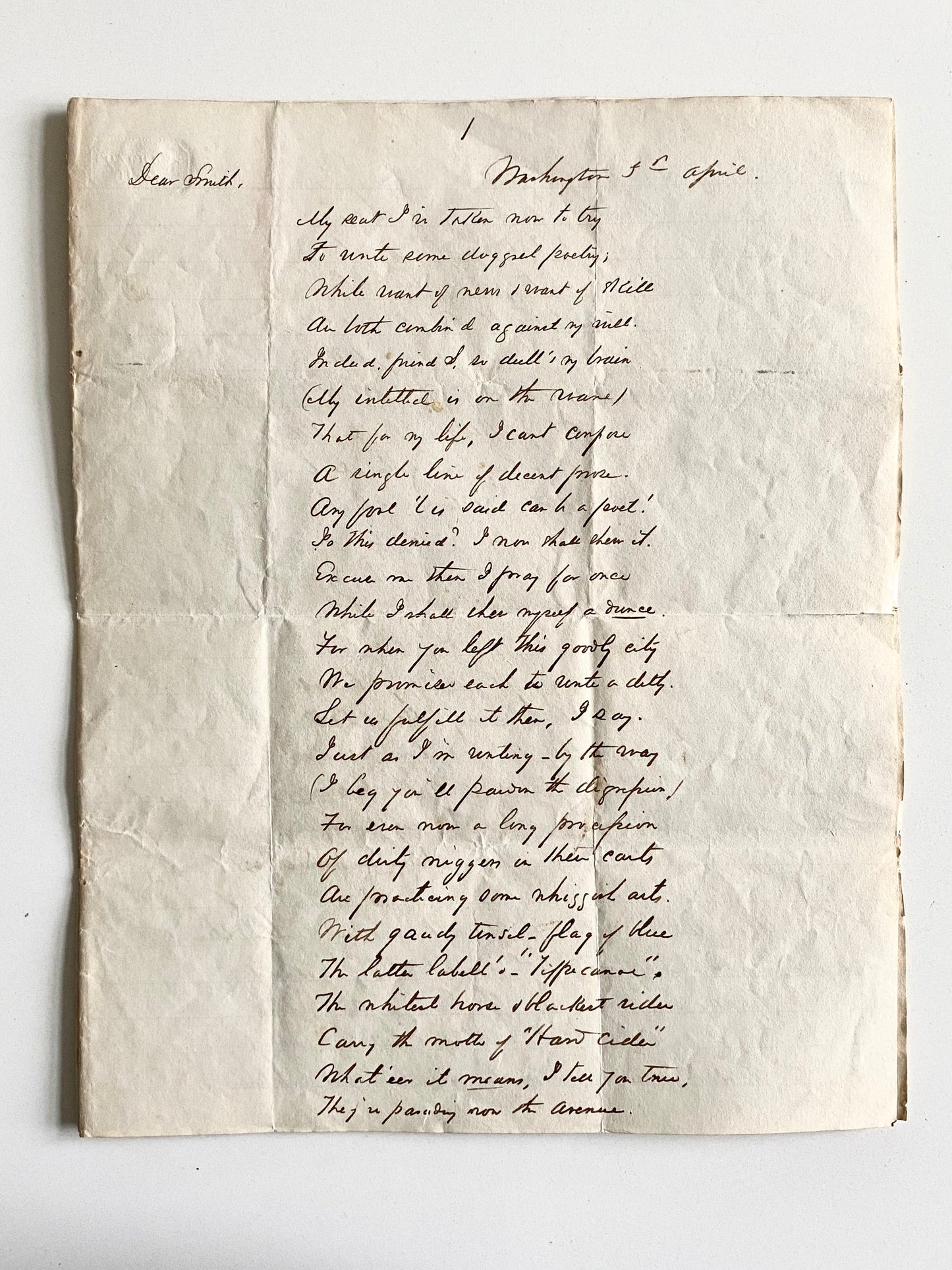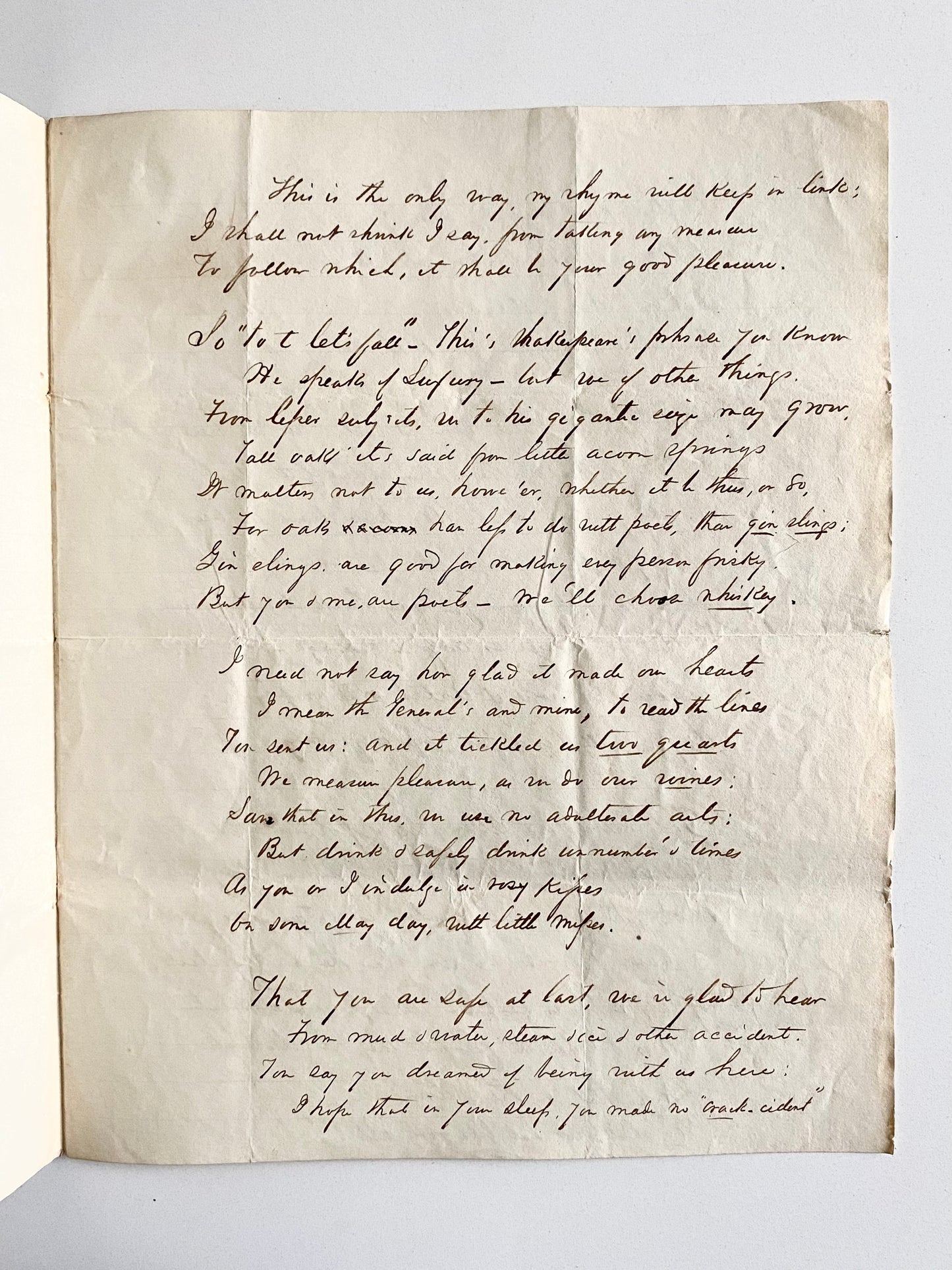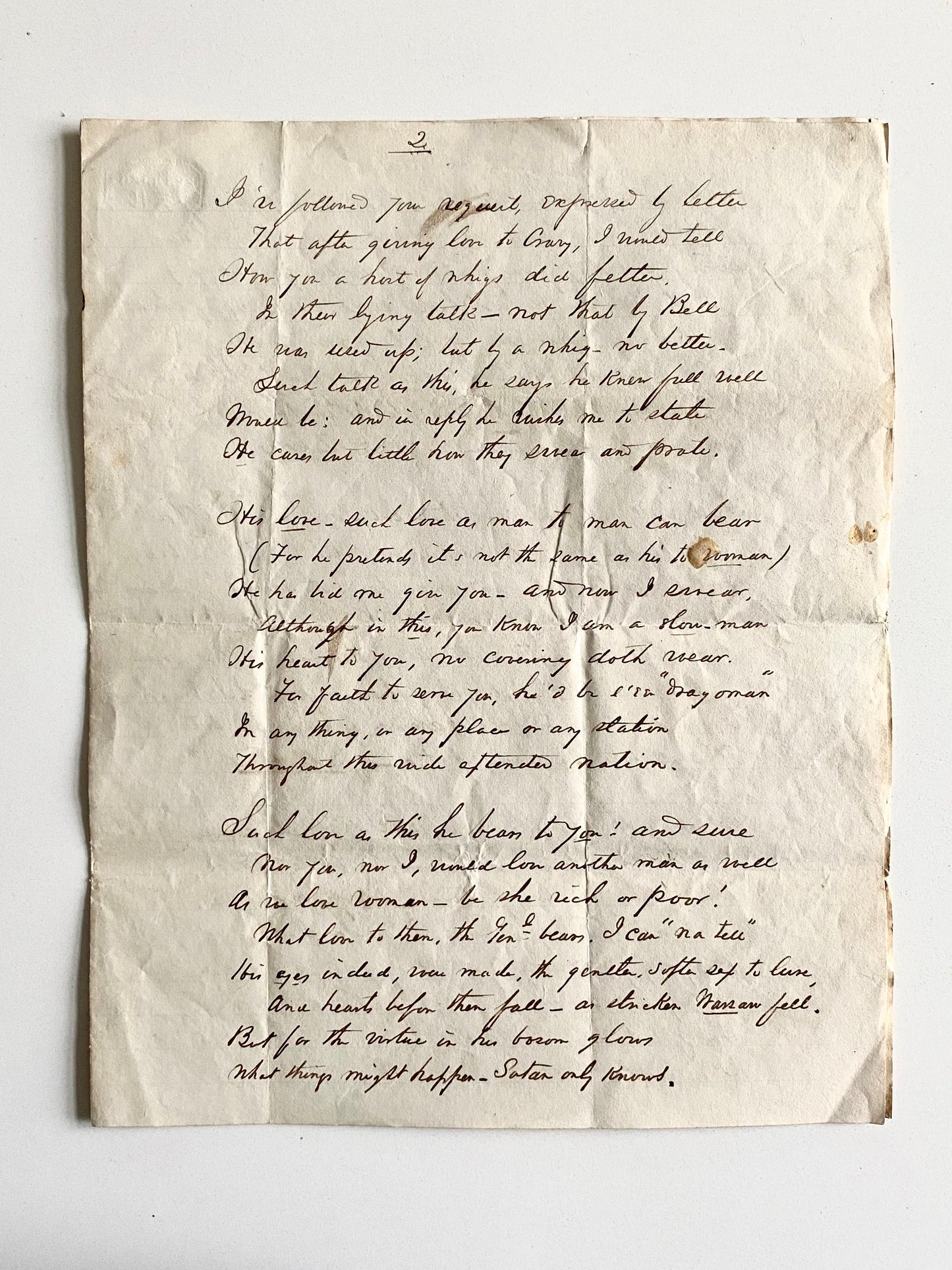Specs Fine Books
1840 WILLIAM HENRY HARRISON Presidential Campaign. Important 8pp Satirical Poem Against the Whigs, on Slavery, &c.
1840 WILLIAM HENRY HARRISON Presidential Campaign. Important 8pp Satirical Poem Against the Whigs, on Slavery, &c.
Couldn't load pickup availability
A superb, unpublished 8pp manuscript poem and satirical epistle by Francis Willett Shearman [1817-1874] to his life-long friend, General Henry Smith [Michigan Militia], who served as General Winfield Scott's "Aide de Camp," fought in the Black Hawk War, the Patriot War, etc., and died with the rank of Major in the Mexican War [1847].
Shearman was admitted to the Bar in Michigan, and became a regular contributor to the Journal of Education. Because of this role and his close relationship with Representative General Isaac Edwin Crary, he was stationed in Washington D. C., from where the present letter was written.
An important and unpublished document touching The Whigs, Michigan Statehood, Slavery, Abolition, and the Status of Black Freedmen in Political Positioning.
Importantly, the letter takes place in the context of an significant moment in the 1840 Presidential Campaign of the "Hero of Tippecanoe," William Henry Harrison.
"General Crary [friend of both Shearman and Smith, and subject of a significant section of the epistle] was a delegate to the state constitutional convention in 1835 and upon the admission of Michigan as a state into the Union, he was elected on October 5 and 6, 1835, as a Jacksonian to the Twenty-fourth Congress. Due to Michigan’s dispute with Ohio over the Toledo Strip (see the Toledo War), Congress refused to accept his credentials and he was seated as a delegate until Congress admitted Michigan as a state of the Union on January 26, 1837. He was re-elected as a Democrat to the Twenty-fifth and Twenty-sixth Congresses, and served until March 3, 1841.
In 1840, during the William Henry Harrison 1840 presidential campaign, on February 14, 1840, as the House of Representatives debated funding for the Cumberland Road, Crary essayed an attack on Harrison's record as an Indian fighter, deeming him a bogus hero. Crary sat down to applause from his fellow Democrats. The next day, Ohio's Thomas Corwin, known as a humorist, rose in the House, and depicted Crary, a militia general in his home state, having to deal with the terrors of the militia's parade day, until afterwards, safe with the survivors, "your general unsheathes his trenchant blade ... and with an energy and remorseless fury he slices the watermelons that lie in heaps around him." According to longtime Washington journalist Benjamin Perley Poore, Corwin's response to Crary was "one of the most wonderful speeches ever delivered at Washington," leaving the House "convulsed with laughter" at Crary's expense. As word of Corwin's speech reached newspapers in February and March, there was much amusement across the nation; Crary failed to be renominated to Congress."
"Dear Smith,
My seat I'm takin now to try
To write some doggrel poetry;
While want of news & want of skill
Are both combin'd against my will.
Indeed, friend S. so dull's my brain
(My intellect is on the wane)
That for my life, I can't compose
A single line of decent prose.
Any fool 'tis said cab be a poet!
Is this denied? I now shall show it.
Excuse me then & pray for once
While shall shew myself a dunce.
For when you left this goodly city
We promised each to write a ditty.
Let us fulfill it then, I say.
Just as I'm writing - by the way
(I beg you'll pardon the digression)
For even now a long procession
Of dirty n****rs in their carts
are practicing some whigged arts.
With gaudy tinsel-flag of blue
That latter labell'd "Tippecanoe."
The whitest horst & blackest rider
Carry the motto of "Hard Cider"
Whate'er it means, I tell you true
They're proceeding now the Avenue.
The whigs for some designing end
Thus laud th hero of North Bend;
Perhaps by taking this position
They mean to go for "Abolition"
What next, they'll do, I can not tell
They swear they'll beat - or go to H__L
Our folks, I said in my first letter
Were sitting still; and nothing better.
Though since Virginia's late election
Has shewn a federal selection,
Of rulers in her home dominion,
They've alter'd somewhat their opinion.
And now all minor questions waived
They're asking "how they shall be saved?"
The answer's plain; Why go to work
Talk about Currency - Beef & Pork
And tell the only true reason
Of hard times; will this be treason?
From former action, one might well suppose
The friends of freedom here - were Freemen's foes!
Here let me hold: I've just receiced your letter
Dated Monroe, th 25th of April; & as you think
Of all our measures, spensers is the better
I'll try to write in that & will not shrink
(As fote we see a woman d, when man has met her,)
This is the only way, my rhyme will keep in link:
I shall not shrink I say, for taking any measure
To follow which, it shall be your good pleasure.
So "t'it let's fall" - This's Shakespeare's phrase you know
He speaks of Luxury - but we of other things.
From lesser subjects unto his gigantic *** may grow,
Tall oaks its said from little acorn springs
It matters not to us, howe'er whether it be thus or so,
For oaks have lss to do with poets, than gin slings;
Gin slings ar egood for making every person frisky.
But you & me are poets - we'll choose whiskey.
I need not say how glad it made our hearts
I mean th General's and mine, to read the lines
You sent us: and it tickled us two quarts
We measure pleasure as we do our wines:
Save that in this, we use no adulterate arts:
But drink & safely drink unnumber'd times
As you or I indulge in rosy kisses
On some may day with little misses.
That you are safe at last, we're glad to hear
From mud & water, steam & ice & other accident.
You say you dreamed of being with us here:
I hope that in your sleep, you made no crack-cident.
As did your waggon, when you came so near
Being upset in mud; Was the driver so hell-bent
That in a dam'd old hard, spring waggon
He wished to send you to the Dragon?
Well, you are safely home at last, & we are here.
And of these two things there is but little doubt.
We miss you very much. We have drank no beer.
Nor punch nor when, when you were left out.
Of our thoughts; and you may think it rather queer,
But we've been as as cross as cabbage - sour crout
I mean: a word of dutch orthography
AS you will find from Lexicography
The news your letter gives of politics in our state
Is very pleasing: That the people are disgusted
With whiggish rule & rulers is certainly **** great
Cause of wonder: I am glad they're "worsted."
If any course is certain to defeat & win will create
It is to when the people they're distrusted.
I hope that in their downfall
We shall not act like fools at all.
I've followed your request, expressed by letter
That after giving love to Crary, I would tell
How you a host of whigs did fetter.
In their lying talk - not that by Bell
He was used up; but by a whig - no better.
Such talk as this, he says, he knew full well.
Would be: and in reply he wishes me to state
He cares but little how they swear and prate.
His love - such love as man to man can bear
(For he pretends it's not the same as his to woman)
He has bid me give you - and now I swear,
Although in this, you know I am a slow-man
His love to you, no covering doth wear.
For fault to serve you, he'd be e'er "dragoman"
In any thing, in any place or any station
Throughout this wide extended nation.
Such love as this he bears to you! And sure
Nor you, nor I, would love another man as well
As we love woman - be she rich or poor!
What love to them, the Gen'l bears. I can "na tell"
His eyes indeed, were made, the gentler, softer sex to lure,
And hearts before them fall - as stricken Nassau fell.
But for the virtue in his bosom glows
What things might happen - Satan only knows.
You say, the whigs declare that General Crary
By Corwin killed, no more can move in politics;
Lord! But that your patience would grow weary
I'd tell you how he feeds such little "peeping' chicks
Of Whiggies: how they of late grow wary
And how his "shirt of *****" on them tightly sticks
And poisons all their thoughts about their Hero.
Whose victories past are numbered Zero.
Full well as I, you know, that Col Johnson at St. Clair,
The British and the Indians drove; While Col Croghan brave
Made Proctor run: and many heard the General swear
"On Croghan's head let this blood be - my hands I save
From this disgrace." Good God! Disgrace like this is sare,
Disgrace like this did Perry share, on proud Lake Erie's wave!
Croghan - a sword - but Harrison, by unanimous vote,
Of Chillicothe ladies - got a - petticoat.
Having thus finished one part of my discourse
And very much I fear I've battered down
The walls of your long patience: I hope no worse
I need not say in verse I am a clown
But pray your mercy, while I beg you will not curse
A poet swamp'd and just about to drown
For I believe in this deep water
I've waded further than I ought to.
To Norvell I have given (as you wished I would)
Your kind regards, and also said to him
How the whigs have braggd, that Porter did & could
Eclipse him in the Senate: and that "slim"
He made him sometimes look & hang his head.
And then I told him how you heard this whim.
And had it been his custom
I think he would have curs'd some.
And now I've little more to say; for I must soon
Come to an end. But by the way you ask
For Congress news, and if there's any room
Of hope for money to our Harbor: It will be a task
To pass a Bill. Old C's are talking still, about the moon
For might as well drink from an empty cask
As to hope for any appropriation
For Harbor safety or creation.
And now you will not say that this poor "missile"
Which had better in the fire be thrown, than read,
Is not at least & more than twice as long as your epistle.
And I'll thank you if you are not dead
To answer soon: And if you are, why, whistle
And your poetic fame & mine, I'll quickly spread.
For in the greatest of sincerity
I think our names will reach posterity.
And now Good Bye - what else you ask I'll do,
And as for the printed bills of B. and Evans
They shall soon be sent. There's nothing further new;
Just at the present time: but should there be by Heavens!
To you, it shall be given - remember I am good and true.
Meanwhile I pray, you may be spared from bailiffs and replevins.
And from all other evils, not here writ
The chief of which is the bottomless pit -
Ever yours,
Francis W [illett] Shearman"
Share








